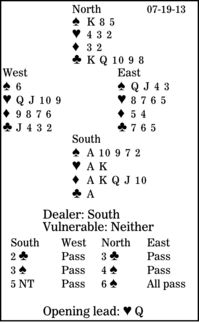Bridge column, July 19: Deduce the danger to your contract

Bridge players who do not think lose a lot of contracts unnecessarily. Bridge players who think but do not wonder about what might go wrong will also lose some contracts.
In today's deal, South is in six spades. How should he play after West leads the heart queen around to declarer's ace? Would South's best play be different if dummy had only K-5-4 of spades?
I strongly approve of North's three-club positive response, showing eight-plus points and five or more clubs. (When responder, holding a strong hand, begins with two diamonds waiting, he either never shows his full strength or is forced to take control.) On the third round, after North raised spades, South used the Grand Slam Force, asking partner to bid seven with two of the top three spade honors. (Nowadays, this convention has almost died out because Roman Key-Card Blackwood uncovers the top trump honors.)
South can afford only one trump loser. If the spades are 3-2, there are no problems. He needs to worry about 4-1 and 5-0.
The correct play is a low spade to dummy's eight. When it loses, South wins the next trick and leads a spade to the king, here getting home. He will be successful more than 94 percent of the time.
If dummy has only K-5-4, South should start with dummy's king, then play low to his 10. His chance has shrunk a tad, to nearly 90 percent.
** ** **
COPYRIGHT: 2013, UNITED FEATURE SYNDICATE
DISTRIBUTED BY UNIVERSAL UCLICK FOR UFS

